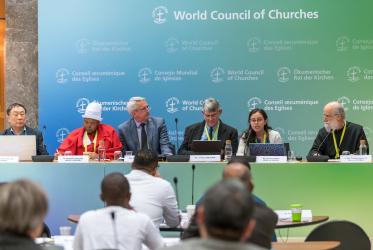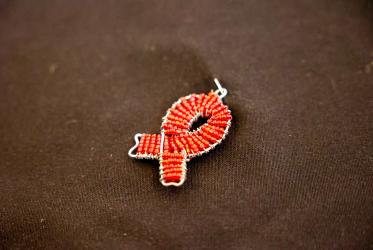The church and HIV/AIDS in Latin America and the Caribbean
Panama City, Panama, 27 January - 1 February 2004
The meeting's objective was to exchange experiences, share methodologies and material and consolidate efforts to reduce the impact of HIV/AIDS in the region.
Representatives of 31 Churches and organisations from Argentina, Bolivia, Brazil, Colombia, Costa Rica, Chile, Cuba, Ecuador, Guatemala, Honduras, Mexico, Nicaragua, Panama, Peru, the Dominican Republic, Switzerland and Venezuela were present at the meeting.
The meeting called for Churches and organisations to combine forces to increase their influence on government policies in the region. In particular, it called for initiatives to develop and implement laws that protect the rights of people living with HIV/AIDS.
Participants agreed to create a forum for reflection that will serve as a foundation on which to build the Church's mission in the field of HIV/AIDS. They drew attention to the fact that many Churches are not committed to working with HIV/AIDS because they are either not aware of the problem or have been badly advised on the matter.
The following message was issued by the meeting:
MESSAGE TO CHURCHES AND ORGANISATIONS THAT WORK ON HIV/AIDS IN LATIN AMERICA AND THE CARIBBEAN
1. In accordance with the gifts given to us by the Holy Spirit, and faithful to the Lord Jesus Christ's call to minister to the needs of our brothers and sisters living with HIV/AIDS, we, a group of 31 organisations and Churches working with people who suffer from or live with those who suffer from HIV/AIDS, met in Panama City at a meeting convened by CLAI and WCC.
2. We came with our hearts open, challenged by the complex and difficult situation that the HIV/AIDS pandemic poses for the Church and civil society.
3. Through God's help, our meeting has been of vital importance in strengthening and shedding new light on our ministry and commitment. We have drawn on our varied experiences and shared information about our initiatives, reflections, activities and limitations, with regard to government policy, the Bible, theology, our pastoral role and science. We each came to this meeting with a message embodied in our own specific contexts, crying out in prayer in our search for solidarity with others. We are grateful and give thanks to God for this forum that CLAI and WCC have offered us.
4. To begin with, we defined some general and specific objectives that served to guide us in our work and show us the way forward. By sharing about our ministries, it has been our desire to send a message of hope to our brothers and sisters living with HIV/AIDS, while also expressing our indignation at their exclusion, stigmatisation and pain. We joyfully recognised their dignity and value in the everyday life of our societies. We also lamented our own limitations, ignorance and lack of abilities. Sometimes, we felt shame at our limitations in the fight to slow down the spread of the pandemic and confessed our complicity in allowing such an alarming situation to develop.
5. Thanks to this meeting, we have broadened our vision of the complex reality experienced by all our brothers and sisters living with HIV/AIDS. We now understand that the religious, social, economic, political and cultural situation is the product of a system that encourages the spread of HIV/AIDS. We are shocked to see that the statistics, and the impact on and attitudes towards HIV/AIDS confirm that we live in a sick society, that requires a complete and radical transformation before we can become new people, new Churches and new societies and thereby show that we are on the path towards the Kingdom of God.
6. The present social and historical context is controlled by dark forces that have an interest in hiding this serious pandemic. The growth of the neoliberal quest for profit and an economic model of globalisation which promotes the development of a market exclusively for those with purchasing power, discriminates against and is insensitive to the needs of two thirds of the population of our continent, who remain exposed to misery and the risks of the epidemic.
7. Faced with this generalised exclusion, we deplore the scandal whereby effective medicines exist, yet thousands of people die every day because they do not have access to them.
8. With profound concern, we recognise that the HIV/AIDS situation reveals the different faces of the church. On the one hand, it reveals the face of indifference, where the church has met and heard the clamour of those who live and are affected by HIV/AIDS in its path, but has nevertheless passed by, like the priest in the parable of the Good Samaritan (Luke 10:27-35). We are also concerned at the Pharisaic face that, from its position of authority, thoughtlessly points an accusing finger and condemns those living in these circumstances as impure and reprehensible sinners. However, it is with gladness that we celebrate meeting the face of the church of love, solidarity and commitment. A face of the church which has encountered many difficulties in the first steps of this ministry to raise awareness, get to know, prevent, care for, accompany and involve oneself once again in this reality. In many cases this simply means to participate in the Easter message of resurrection, dying to rise up another day.
9. In accordance with the signs of the times that we have shared at this CLAI/WCC meeting, people living with HIV/AIDS, in all situations and circumstances, represent both an opportunity and a challenge for the pastoral ministry of our churches today.
10. We recognise that this situation does not only affect the people who are living with HIV/AIDS, It also affects all people right across the world. It is, therefore, imperative to announce prophetically the responsibility of church and society to work in solidarity, so that, as one, we can take on the task required by the situation. It is our duty to ensure respect for the human rights of all people living in this situation.
For the love of Jesus Christ, our Lord, we call on our faith communities to fully prepare themselves, from a biblical and theological perspective, to take responsibility for this ministry.
"Blessed be the God and Father of our Lord Jesus Christ, the Father of mercies and the God of all consolation, who consoles us in all our affliction, so that we may be able to console those who are in any affliction with the consolation with which we ourselves are consoled by God. For just as the sufferings of God are abundant for us, so also our consolation is abundant through Christ." (II Cor. 3:5).





